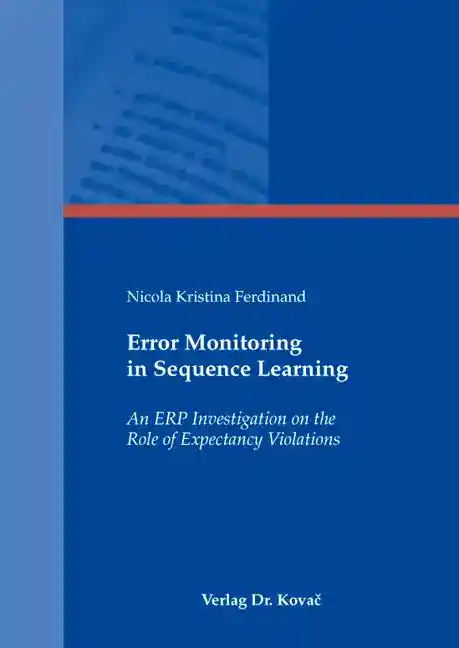Nicola Kristina FerdinandError Monitoring in Sequence Learning
An ERP Investigation on the Role of Expectancy Violations
Studienreihe psychologische Forschungsergebnisse, Band 139
Hamburg 2008, 194 Seiten
ISBN 978-3-8300-4086-6 (Print)
ISBN 978-3-339-04086-2 (eBook)
Zum Inhalt
Actions that are followed by positive events are more likely to be repeated in the future, while actions that are followed by negative outcomes are less likely to be repeated. This implies that behavior has to be evaluated in the light of its potential consequences, and non-reward events (i.e., errors) must be detected for reinforcement learning to take place. In other words, humans constantly monitor their performance in order to detect and correct errors, and this allows them to successfully adapt their behavior to changing environmental demands and acquire new behavior, i.e., to learn.
The basic mechanisms of reinforcement learning have been extensively studied in animals and the mesencephalic dopamine system was found to play a crucial role. Extending this idea to error-induced learning in humans, the reinforcement learning hypothesis suggests that when an expectancy mismatch occurs during reinforcement learning and an event is evaluated as „worse than expected?, a phasic decrease in dopaminergic activity occurs. This drop in midbrain dopamine is thought to elicit the error-related negativity (ERN) or error negativity (Ne), a negative deflection in the response-locked event-related potential (ERP) that is known to occur after subjects commit an error. In the reinforcement learning hypothesis, it is assumed that the ERN/Ne is used as a feedback signal for learning.
Following this line of thought, the presented work used ERPs to examine whether the detection of errors and their implication for learning require an intention to learn, or can occur without awareness. Put differently, it was examined whether errors subjects are unaware of can be used as internal feedback signals that mediate learning. Additionally, the modulation of these error monitoring processes in old age and the functional role of expectancies and expectancy violations in the context of learning were investigated.
